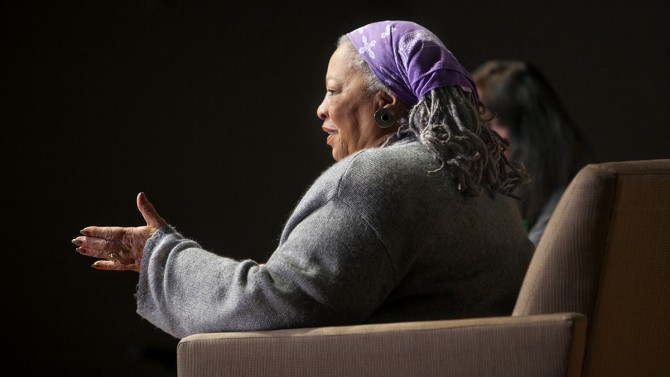Toni Morrison to be inducted into Women’s Hall of Fame
By Kathy Hovis
Nobel and Pulitzer Prize-winning author Toni Morrison, M.A. ’55, will be one of six women inducted into the National Women’s Hall of Fame in Seneca Falls, New York.
The virtual induction ceremony, scheduled for Dec. 10 at 7:30 p.m., is open to the public. Registration is required.
Morrison, who died Aug. 5, 2019, at age 88, earned a bachelor of science degree in English in 1953 at Howard University and a master’s degree in American literature in 1955 at Cornell. Her master’s thesis was on “Virginia Woolf’s and William Faulkner’s treatment of the alienated.”
An A.D. White Professor-at-Large at Cornell from 1997 to 2003, Morrison returned to the Ithaca campus numerous times over the years. She was the Robert F. Goheen Professor Emerita of the Humanities at Princeton, where she taught from 1989 to 2006.
Her first novel, “The Bluest Eye,” was published in 1970. She wrote 10 other novels that explored and illuminated the Black American experience, including “Beloved,” for which she won the Pulitzer Prize in 1988, and “Song of Solomon,” which earned her a National Book Critics Circle Award in 1977.
She also wrote “Jazz,” “Sula,” “Tar Baby” and “Paradise,” as well as children’s books and essay collections. In 1993, Morrison became the first Black woman to win the Nobel Prize in literature.
The College of Arts and Sciences is in the midst of a yearlong celebration of Morrison, which included an Oct. 8 reading of “The Bluest Eye” featuring authors, poets, students and community members, and an Oct. 15 teach-in with Cornell faculty members. Spring events include a roundtable discussion with Morrison scholars, a staged reading of Morrison’s work and various reading groups and displays.
Other 2020 Women’s Hall of Fame inductees include Aretha Franklin, singer and activist; Mary Church Terrell, suffragist; Barbara Hillary, adventurer; Barbara Rose Johns, activist and librarian; and Henrietta Lacks, who revolutionized medical research.
Kathy Hovis is a writer for the College of Arts and Sciences.
Media Contact
Get Cornell news delivered right to your inbox.
Subscribe

